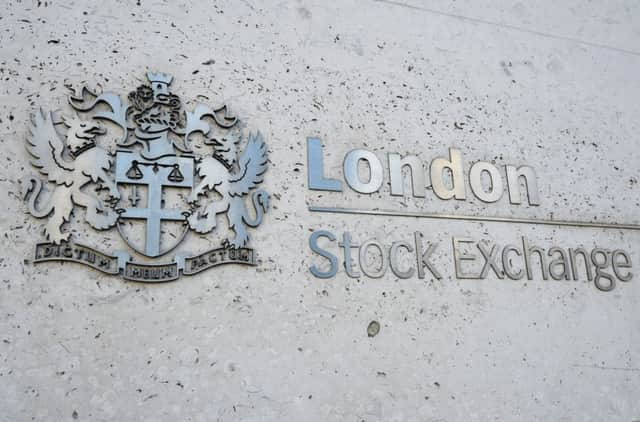Bill Jamieson: Investment funds' midas touch may be lost, but that could change


But today, after conspicuously poor performance, they pose an acute dilemma for investors: should they cut their losses and run, or hang on in the hope of recovery?
The best known is Neil Woodford. For a long period he was outstandingly successful manager of the Invesco Perpetual Income and Perpetual High Income funds.
Advertisement
Hide AdAdvertisement
Hide AdSuch was his reputation that when he left Invesco in 2014 to launch his own Woodford Patient Capital Trust it attracted a breath-taking £800 million.
Not far behind in the popularity stakes was fund manager Mark Barnett, manager of the £878 million Perpetual Income & Growth Investment Trust for almost 20 years.
But the most stunning investment pull of them all in recent years has been Standard Life’s Global Absolute Return Fund (GARS). Launched in 2006 with a dizzying mix of shares, bonds, hedge funds and futures, it claimed to provide investors “positive investment returns in all market conditions over the medium to long term”. Though few really understood the product – investment advisers asked by clients how they worked retreated behind a muttered “complex algorithms” – it was an immediate hit, with the fund pulling in more than £20 billion in its first years.
Smart was the investor whose stock market portfolio held all three funds. What could possibly go wrong? But how fortunes change. Today all three have fallen well short of performance expectation and investors have been leaving in droves.
Woodford Patient Capital has tumbled out of the FTSE250 after a prolonged run of poor performance. Today shares in the trust languish at 73.9p, having lost more than a quarter of their value since launch at 100p three years ago. In sharp contrast, the UK All Companies sector has risen by some 27 per cent over this period.
Meanwhile Mark Barnett at Perpetual Income & Growth has just reported a second year of underperformance. Net asset value including dividends paid, fell 5.6 per cent in the 12 months to end March, compared to a 1.2 per cent gain from its FTSE All-Share benchmark.
The negative return was worse than the previous 12 months when the trust missed out on the post-EU referendum rally that pushed the All-Share 22 per cent higher, with Perpetual’s shares returning just 4.2 per cent. The combination of the two poor years has also affected longer-term performance. Over 10 years to 30 May Perpetual Income has slipped to ninth out of 24 trusts in the AIC UK Equity Income sector.
Why has this trust performed so poorly? The managers have held on tightly to tobacco stocks such as BAT and Imperial Brands while they were caught out with exposure to doorstep lender Provident Financial and outsourcing giant Capita.
Advertisement
Hide AdAdvertisement
Hide AdNowhere has the fall from grace been more steep than at Standard Life’s GARS. Investors pulled more than £10 billion from the fund last year, more than double the £4.3 billion withdrawn in 2016. Over three years the wizard fund of dancing algorithms lost 2 per cent against a sector rise of 5 per cent.
Some blame an obsession to avoid market volatility, others argue that the fund became too large to manage efficiently while many blame a stream of management changes. Paul Gibson, adviser at Aberdeen-based Granite Financial Planning, says: “We don’t use Absolute Return funds as we don’t feel they work and the only absolute thing they deliver is higher charges.”
The fieriest attack has come from Alan Miller, husband of anti-Brexit campaigner Gina Miller and an outspoken critic of the fund management industry. He has called GARS “potentially one of the greatest mis-selling scandals in the UK”.
Someone who invested in Gars in May 2013 has seen their money grow just 0.7 per cent, compared with the 43 per cent gain in the FTSE All Share. The returns on Gars are so poor that even if investors had left their cash in the bank five years ago at derisory deposit rates, they would have earned more.
The aim to provide positive investment returns in all market conditions over the medium to long term is, he says, “complete balderdash. How can any fund produce positive returns in all market conditions?”
The fund’s fact sheet would baffle all but the most intrepid. It tells investors that the fund is invested in a number of “relative value strategies”, including a “Swedish flattener v Canadian steepener”, while its “directional strategies” include “Long INR (the Indian rupee) v CHF” (the Swiss franc).
“It is incomprehensible,” says Miller. “I challenge that anyone, advisers or consultants, could possibly understand the strategies in which the fund participates.”
Investors have already decided to be quitters rather than cling-ons. But what of the two equity trusts? It is tempting to join the rush to the exit. But investors should not be too dismissive.
Advertisement
Hide AdAdvertisement
Hide AdShares in Woodford Patient Capital are now at an 11.3 per cent discount to net assets – one of the largest in the sector. And shares in Perpetual Growth and Income at 365.5p is on a discount of 10.3 per cent and yield 3.8 per cent. I’d be tempted to be a cling-on for now.